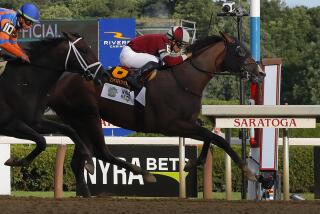Region Has a Lot Riding on a Smarty Jones Win
BENSALEM, Pa. — His bloodline is less than royal. His home track is hardly among the nation’s elite. Several siblings died of a rare equine disease, and he once banged his head so hard on a starting gate that he fractured his skull. His first trainer was murdered. And his jockey once beat a man unconscious with a pool cue, a beer bottle and a stool.
Nothing special was expected of Smarty Jones, a smallish chestnut colt, when he was born in Pennsylvania’s mushroom country three years ago. But since he began racing for cash last year, he has never lost. In fact, after taking the lead in his eight races, no horse has ever passed him.
On Saturday, in the elite horse country of Long Island, N.Y., the little thoroughbred from nowhere will attempt to become just the 12th horse to win racing’s Triple Crown. Smarty Jones, who shocked the thoroughbred establishment by winning the Kentucky Derby and the Preakness Stakes, is the heavy betting favorite for Saturday’s Belmont Stakes. The last Triple Crown winner was Affirmed in 1978.
There is more riding on Smarty Jones’ sleek back than a mere horse race. He carries with him the hopes of a region located far from the equestrian aristocracy, as well as the fortunes of an industry struggling to hold its share of America’s sports market.
Philadelphia, a city with a nagging inferiority complex and desperate for a winner, has embraced Smarty Jones. More than 8,000 people turned out to watch a recent dawn workout. The general manager of the Philadelphia 76ers took a Smarty Jones horseshoe to the NBA draft lottery, and the Philadelphia Flyers adopted the horse -- nicknamed the Philadelphia Flyer -- as a good luck charm.
Philadelphia has gone 21 years without a major sports championship. With the Flyers’ recent Stanley Cup hockey playoff loss, the 76ers’ miserable season, the Eagles’ third straight loss just short of the Super Bowl and the Phillies’ long World Series drought, the city is now counting on a horse to deliver.
The city’s newspapers feature several Smarty Jones stories a day. Local newscasts provide regular updates on his training regimen and camp followers. On Tuesday, the big story was the three-state police escort for the colt as he made his way north to Belmont, trailed by fans.
Even Pennsylvania Gov. Ed Rendell has jumped on the Smarty Jones bandwagon, trying to parlay the horse’s surging popularity into legislative approval for slot machines at the state’s downtrodden racetracks. Like the 76ers and the Flyers, the governor has yet to prevail.
Thousands of schoolchildren from around the country have written to Smarty Jones, a reflection of a renewed interest in horse racing spurred in large part by the colt’s unlikely ascent in the sport of kings. Fans who never before paid attention to horse racing are lining up for official Smarty Jones hats, T-shirts, key chains and glossy photos -- but, mercifully, no Smarty pants.
“It’s really remarkable to think what this horse had to go through to get to where he is,” said his trainer, John Servis, who has been inundated with requests for Smarty Jones’ autograph (his horseshoe prints are for sale) and marriage proposals (for the horse, not the trainer).
There was no talk of a Triple Crown run when Smarty Jones was born in nearby Chester County in February 2001, on a farm that is now home to more alpacas than horses. His owner, Roy Chapman, a self-described “ham and egger” Philadelphia horseman who made a fortune selling cars, had to sell the farm because of health problems. Chapman, 78, has emphysema and watches Smarty Jones’ races from a wheelchair equipped with an oxygen tube.
He had to find a new trainer after Robert Camac, who had recommended that Chapman breed the stallion and mare that produced Smarty Jones, was murdered by his own stepson nine months after Smarty was born.
Smarty Jones’ sire, Elusive Quality, was a record-setting speed horse that never won a race longer than a mile. His dam, I’ll Get Along, was a brood mare with speed and several stakes race wins but no history of running long races.
“All the gurus said he’s never going to get past a mile -- he’s not bred for it,” said Servis, who replaced Camac as trainer. The Kentucky Derby, Preakness and Belmont are each more than a mile long; the Belmont, at a mile and a half, is the longest of the three.
“Smarty has outrun his pedigree,” said Keith Jones, the announcer at Philadelphia Park, the humble racing oval just across the city line in working-class Bensalem. The colt holds the record for the longest combined winning margin in the Kentucky Derby and Preakness. If Smarty Jones wins Saturday, he and Seattle Slew (1977) would be the only undefeated Triple Crown champions.
Typically, Jones said, thoroughbreds start fast and then gradually slow over the course of a race. Smarty Jones is the exception -- he actually maintains his speed for nearly an entire race, Jones said.
“He glides -- he’s so smooth you almost don’t hear him,” he said.
Cecil Seaman, a biomechanics expert in Lexington, Ky., who rates thoroughbreds for buyers, calls Smarty Jones “pretty close to the perfect horse. He has everything he needs to be a champion -- plus a few extras. He’s just phenomenal.”
Of the 66,000 thoroughbreds Seaman’s firm has rated over the last 34 years, Smarty Jones is at the very top. He ranks slightly ahead of several Triple Crown winners, including Secretariat (Smarty’s great-great grandfather), Affirmed and Seattle Slew.
Smarty Jones earned the firm’s highest possible ratings for “leverage,” the optimum length of the shoulders and legs; for “ratio,” a horse’s leverage times its mass; and for “gravity,” or body proportion. He even has what Seaman calls “great nostrils,” which expand to provide generous amounts of oxygen.
“He’s not a big horse, but he’s the perfect-sized horse,” he said. “He has more power and leverage than much bigger horses” because of his powerful shoulders and hindquarters.
Smarty Jones also has a champion’s temperament and personality, said his jockey, Stewart Elliott. He’s exceptionally aggressive and competitive, but also relaxed. “He has plenty of natural speed and he’s learned to control it,” Elliott said. “He’s not your average horse.”
Elliott is not your average jockey. In a drunken rage in August 2000, he fractured a friend’s eye socket by beating him with a pool cue, beer bottle and stool. He was placed on a year’s probation and ordered to pay $13,900 for the victim’s medical bills. In 2001, Elliott pleaded guilty to simple assault and criminal mischief for incidents involving his former girlfriend.
Elliott underwent treatment at an alcohol rehabilitation center. He was fined $1,000 in May for not acknowledging his arrests on a Kentucky Derby entry form, but has since talked openly about his past.
“There’s nothing to hide anymore,” he said. “I got it all out there, and it’s over with.”
Smarty Jones has his own wild past. At Philadelphia Park in July 2003, he banged his head violently against a starting gate and collapsed, blood spurting from his oversized nostrils.
He suffered several small fractures of his left eye socket, plus a hairline skull fracture, but recovered.
Early on, Servis said, he was worried that Smarty Jones was too high-strung to be a champion. Even now, he said, “he’ll kick you, he’ll bite you.”
But over the last year, Servis said, the colt has matured. “He’s a happy horse. He’s laid back and takes everything in stride,” he said.
If Smarty Jones wins the Belmont, his owners will earn a $5-million bonus from a credit card company that has prepared two ads featuring the colt. But that’s pocket change compared to what Chapman and his wife, Patricia, likely will earn for Smarty’s stud services -- whether or not he wins the Triple Crown.
In one of several posters of Colonial-era thoroughbreds displayed at the Library Company of Philadelphia -- an independent research library specializing in American culture through the 19th century -- a 1796 poster of Melzar, a Smarty Jones ancestor, requests a 5-pound stud fee. The breeding rights to Secretariat, the 1973 Triple Crown winner, were sold for a then-record $6.08 million. Smarty Jones will probably earn 10 times that amount, breeding experts say.
Ron Turcotte, Secretariat’s jockey, has predicted that Smarty Jones will win the Belmont by 25 lengths. Seaman said no horse in the race was capable of beating the colt from Pennsylvania. Smarty Jones will lose only if he beats himself, he said.
For Servis’ wife, Sherry, who handles most of Smarty Jones’ mail, the race will represent the climax of a ride that took an unknown horse from an out-of-the-way track further than anyone ever imagined.
“I feel like this is a fairy tale,” she said, “and I’m in it.”











